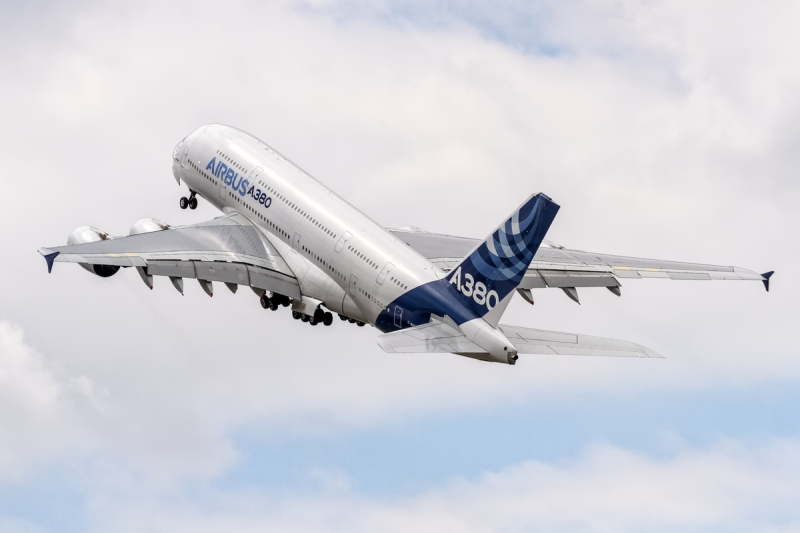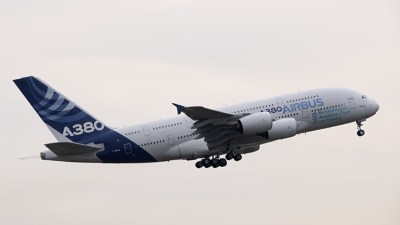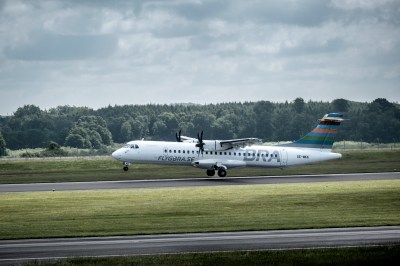

Airbus A380 Completes Flight Powered By Cooking Oil
source link: https://hackaday.com/2022/07/12/airbus-a380-completes-flight-powered-by-cooking-oil/
Go to the source link to view the article. You can view the picture content, updated content and better typesetting reading experience. If the link is broken, please click the button below to view the snapshot at that time.

Airbus A380 Completes Flight Powered By Cooking Oil

Fossil fuels are making news for all the wrong reasons of late. Whether it’s their contribution to global climate change or the fact that the price and supply hinges on violent geopolitics, there are more reasons than ever to shift to cleaner energy sources.
In the world of aviation, that means finding a cleaner source of fuel. A test earlier this year took place in pursuit of that very goal, where an Airbus A380 airliner was flown solely on fuel derived from cooking oil.
Sustainable Fuels Are Key

An Airbus A380 served as the testbed for 100% SAF fuel, running one engine solely on the cooking oil-derived product. The world’s largest airliner is seeing declining use as smaller, more fuel-efficient planes are taking over. Credit: Airbus
Globally, aviation activity produces around 2.1% of carbon dioxide emissions attributable to human activity. As a whole, it makes up 12% of emissions from transport as a whole. While emissions dipped thanks to the impacts of the COVID-19 pandemic, on a whole, those emissions are trending back up as the industry has returned to regular operation.
One way to reduce this figure is to switch to a sustainable fuel source. When fossil fuels are dug up and burned, they release stored carbon into the atmosphere, creating warming. However, so-called Sustainable Aviation Fuel (SAF) gets around this problem by relying on organic ingredients. The idea is that the carbon dioxide released from its combustion is offset by the carbon dioxide absorbed by the crops and organic matter used in its production. It’s imperfect, and certainly not a true zero-emissions solution; outside of losses and inefficiencies, combustion engines of all types tend to produce other harmful gases like oxides of nitrogen. However, it is still a serious improvement over traditional fossil fuels; Airbus claims that flying planes on SAF could net a reduction in carbon output of 53% to 71%.
To demonstrate the concept, an Airbus A380 was flown on March 25 from Blagnac Airport in Toulouse, France, where Airbus is based. The plane completed a three-hour flight, with one Rolls-Royce Trent 900 jet engine running on 100% sustainable aviation fuel. A further test was executed on March 29, where the fuel was used during the demanding take-off and landing phases.

Neste, ATR, and Swedish airline Braathens Regional Airlines teamed up to run a plane on 100% SAF in both engines. The companies hope to get certification to run 100% sustainable fuel by 2025. Photo credit: ATR
The fuel supplied for the test came from French company TotalEnergies. The specific type of SAF fuel used is known as HEFA-SPK, or Hydroprocessed Esters and Fatty Acids – Synthetic Paraffinic Kerosene. It’s made by chemical treatment of waste cooking oils and fats, which processes it into a usable substitute for kerosene-type jet fuels.
HEFA-SPK fuel is in many ways a mature technology, and is already being used in aviation today. Airbus aircraft are already approved to fly on 50% blends of HEFA-SPK with regular jet fuel, and it makes up 1% of jet fuel used globally. However, for now, it’s still more expensive than regular jet fuel, and production is limited, slowing its uptake.
Airbus’s tests were successful, and build upon earlier tests which got 50% blends approved for use. The company hopes to get planes certified to use 100% SAF by the end of the decade.
They’re not the only company working in this space, either. Where Airbus elected to run just one engine on SAF, others are going further. Swedish SAF supplier Neste recently completed a test in partnership with ATR and Braathens Regional Airlines. The successful test ran both engines of a ATR 72-600 small regional airliner on SAF. It builds on several prior tests on single engines, and the companies hope to get certified for 100% SAF use by 2025.
Overall, there’s still much work to be done before airlines are running solely on sustainable fuel. The safety-conscious, conservative nature of airline regulations mean that it will still be some time before the fuel is approved for use in all conditions. Production capacity must also be ramped up, along with provisions made for distributing the fuel to airports. In the absence of regulations promoting its use, SAFs must also find a way to compete with fossil fuels on price, or people will have to show that they’re willing to pay a green premium.
However, none of these hurdles are insurmountable. Expect more flights to run on SAF blends in the short term, and to see the fuel take over entirely in some applications in future.
[Banner Image: “F-WWOW” by Oliver Holzbauer. Thumbnail: Airbus A380-800 by Steve Elliott.]
Recommend
About Joyk
Aggregate valuable and interesting links.
Joyk means Joy of geeK